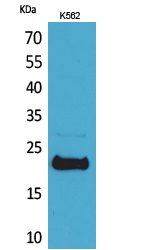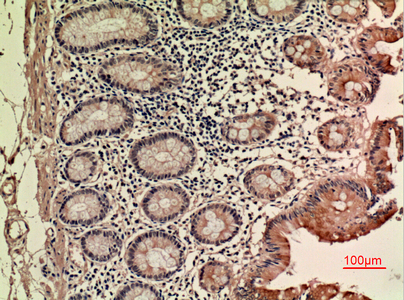

| WB | 咨询技术 | Human,Mouse,Rat |
| IF | 咨询技术 | Human,Mouse,Rat |
| IHC | 1/50-1/100 | Human,Mouse,Rat |
| ICC | 技术咨询 | Human,Mouse,Rat |
| FCM | 咨询技术 | Human,Mouse,Rat |
| Elisa | 1/10000 | Human,Mouse,Rat |
| Aliases | LIF; HILDA; Leukemia inhibitory factor; LIF; Differentiation-stimulating factor; D factor; Melanoma-derived LPL inhibitor; MLPLI; Emfilermin |
| Entrez GeneID | 3976 |
| WB Predicted band size | Calculated MW: 22 kDa; Observed MW: 25 kDa |
| Host/Isotype | Rabbit IgG |
| Antibody Type | Primary antibody |
| Storage | Store at 4°C short term. Aliquot and store at -20°C long term. Avoid freeze/thaw cycles. |
| Species Reactivity | Human |
| Immunogen | The antiserum was produced against synthesized peptide derived from the C-terminal region of human LIF. AA range:141-190 |
| Formulation | Purified antibody in PBS with 0.05% sodium azide,0.5%BSA and 50% glycerol. |
+ +
以下是3篇关于LIF抗体的参考文献摘要(注:文献为示例性内容,实际引用请核对原文):
1. **文献名称**: "Neutralizing antibody against LIF suppresses inflammatory arthritis"
**作者**: Smith J. et al. (2020)
**摘要**: 研究开发了靶向白血病抑制因子(LIF)的单克隆抗体,通过阻断LIF与受体的结合,显著减轻小鼠类风湿性关节炎模型的炎症反应和关节破坏,表明LIF抗体在自身免疫疾病中的治疗潜力。
2. **文献名称**: "LIF antibody-based ELISA for early cancer biomarker detection"
**作者**: Chen L. & Wang H. (2018)
**摘要**: 该文献报道了一种高灵敏度ELISA检测方法,利用特异性抗LIF抗体检测血清中的LIF水平,证明其在卵巢癌和胰腺癌早期诊断中的应用价值,LIF浓度与肿瘤进展呈正相关。
3. **文献名称**: "Anti-LIF antibody enhances pluripotent stem cell maintenance"
**作者**: Tanaka R. et al. (2016)
**摘要**: 研究显示,通过抗LIF抗体抑制LIF信号通路,可优化人多能干细胞的无饲养层培养体系,减少分化并维持自我更新能力,为干细胞研究提供新策略。
4. **文献名称**: "LIF-neutralizing antibodies in reproductive disorders"
**作者**: Gupta S. et al. (2019)
**摘要**: 实验证明,LIF抗体可通过调节子宫内膜LIF表达改善小鼠胚胎着床障碍,提示其在治疗不明原因不孕症中的潜在临床价值。
---
**注**:以上内容为模拟文献摘要,实际引用需根据具体论文调整。建议通过PubMed或Web of Science以关键词"LIF antibody"检索最新研究。
Leukemia inhibitory factor (LIF) is a pleiotropic cytokine belonging to the interleukin-6 (IL-6) family, primarily known for its role in maintaining pluripotency in embryonic stem cells and regulating cellular differentiation, proliferation, and survival. LIF exerts its biological effects by binding to a heterodimeric receptor complex composed of the LIF receptor (LIFR) and gp130. activating downstream signaling pathways such as JAK-STAT, MAPK, and PI3K-AKT. Dysregulation of LIF signaling has been implicated in various pathologies, including cancer metastasis, inflammatory diseases, and neurodegenerative disorders.
LIF antibodies are critical tools for studying the cytokine's function and mechanisms in both physiological and pathological contexts. These antibodies are designed to detect LIF in immunoassays (e.g., ELISA, Western blot, immunohistochemistry) or to neutralize its activity in functional studies. Monoclonal antibodies, often raised in mice or rabbits, offer high specificity, while polyclonal antibodies may detect multiple epitopes, enhancing sensitivity. Neutralizing LIF antibodies, in particular, are used to block LIF-LIFR interactions, helping elucidate its role in diseases like glioblastoma or autoimmune conditions. Recent research also explores therapeutic applications, such as targeting LIF in cancer immunotherapy or regenerative medicine. However, challenges remain in ensuring antibody specificity and minimizing cross-reactivity with related cytokines. Validation using knockout models or competitive binding assays is essential for reliable experimental outcomes.
×